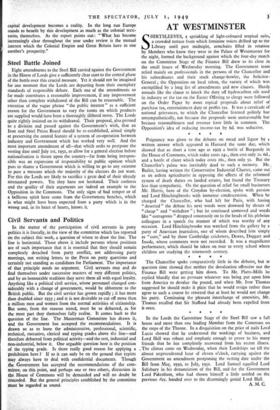Civil Servants and Politics
In the matter of the participation of civil servants in party politics it is literally, in the view of the committee which has reported on the subject this week, a question of where to draw the line. The line is horizontal. Those above it include persons whose positions are of such importance that it is essential that they should remain completely detached from party conflict, not addressing party meetings, not writing letters to the Press on party questions and certainly not standing as candidates for Parliament. The importance of that principle needs no argument. Civil servants may and do find themselves under successive masters of very different politics, and by an honourable tradition they serve them all with equal loyalty. Anything like a political civil service, whose personnel changed con- siderably with a change of government, would be abhorrent to the British public. But the civil service has grown rapidly ; it has more than doubled since 1935 ; and it is not desirable to cut off more than a million men and women from the normal activities of citizenship. But some, from the reasons stated, must be so debarred, as for the most part they themselves fully realise. It comes back to the question of the line. The Masterman Committee has drawn it, and the Government has accepted the recommendations. It is drawn so as to leave the administrative, professional, scientific, technical, executive, clerical and typing grades above the line—and therefore debarred from political activity—and the rest, industrial and non-industrial, below it. One arguable question here is the position of the typing grade. Is there really good reason for applying a prohibition here ? If so it can only be on the ground that typists may always have to deal with confidential documents. Though the Government has accepted the recommendations of the com- mittee, on this point, and perhaps one or two others, discussion in the House of Commons will be demanded and will no doubt be conceded. But the general principles established by the committee must be regarded as sound.






































 Previous page
Previous page